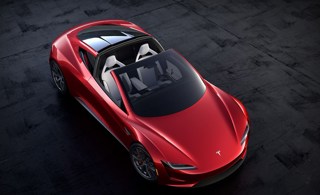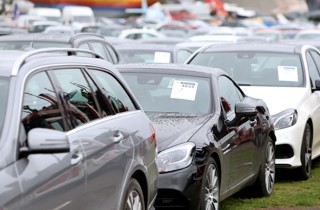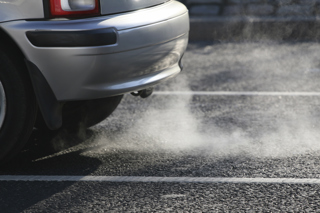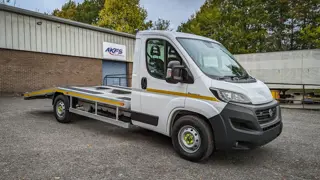The rate of “cash burn” within automotive sector businesses will come under close scrutiny during the COVID-19 coronavirus lockdown, according to GlobalData.
The Automotive industry analyst said that as the lockdown persists in a UK new car market that is unlikely to surpass 1.7 million units in 2020, the decline in trading is set to become “even more vertiginous” and attract attention to the financial fortunes of OEMs, suppliers and car retailers.
David Leggett, Automotive Analyst at GlobalData, noted that yesterday’s new car registrations volume data, published by the Society of Motor Manufacturers and Traders (SMMT), showed “a steeper fall than we saw during the last financial crisis”, underlining the heavy impact on the automotive industry being wrought by the COVID-19 crisis.
Leggett added: "April will likely turn out to be a month of full lockdown in the UK, which would see an even more vertiginous decline year-on-year.
"Even assuming a recovery later in the year, net consumer spending will be well down on pre-crisis levels and the UK car market will struggle to reach 1.7 million units against previous expectations that it would turn out in excess of two million units.
"The severe slump to demand means huge challenges ahead for vehicle manufacturers and suppliers who are struggling with cash flow while the crisis persists, with plants shut and the new vehicle market seized up.
"Company cash positions and rates of burn will come under increasing scrutiny in the coming months."
Car retailers urged to stand firm
In a webinar last week, ASE Global’s chairman Mike Jones said dealers should maintain or increase dialogue with their banks and funders during the current crisis, adding: “We should be planning for the future, looking at what the cash position will be, to tell them about potential problems and have plans A, B and C ready.”
He said dealers can be building a pipeline, to get arranged for a fast start when showrooms open again.
Historically, after other crises, new car sales and service bookings once recovery begins can lag slightly but used car sales build quickly, he said.
Jones also advised all dealers to “steer clear” from cashing out of stock if possible.
“The one thing people shouldn’t be doing is panic selling,” he said. “It’s very difficult from a cashflow point of view, but there is no market out there from a demand point of view, so if people are looking to liquidate stock it’s a phenomenally difficult time to do that.”
COVID-19’s impact on EV sales
GlobalData’s recent analysis of the impact of the coronavirus outbreak extended into the potential setbacks that ever lower fuel prices could have on car buyers’ desire to buy and electric vehicle (EV) once the market is up and running once more.
Car manufacturers have been keen to drive alternative fuel vehicle (AFV) sales in 2020 as an influx of new models reaches showrooms in time to mitigate the impact of new EU emissions regulations which can result in stringent fines.
But GlobalData said that the COVID-19 crisis could reduce EV demand and impair EU efforts to significantly reduce average new vehicle CO2 emissions.
Mike Vousden, Automotive Analyst at GlobalData, said: “GlobalData’s analysis suggests that low oil prices will lead to a longer waits for the reduced fuel costs offered by electric vehicles (EVs) to amortize their higher purchase prices.
"This could prove very problematic for the industry in a year that was supposed to mark the big shift to EVs to reduce fleet CO2 emissions in line with new tighter EU CO2 targets.”
EVs typically cost more than an equivalent internal-combustion-engined (ICE) vehicle but their lower running costs reduce that price differential over time and, in the longer term, end up costing less overall than their ICE counterparts.
However, the amount of time taken to make up that price differential depends on the cost of fuel.
Higher prices at the pumps mean EVs make up their extra purchase cost sooner, GlobalData observed, while lower fuel prices see ICE cars remain cheaper than EVs for longer.
Vouden said: "Much lower pump prices for gasoline and diesel have been ushered in by the COVID-19 crisis and a big hit to global oil demand.
“If pump prices are low in the long-term this will throw into question the economic case for users switching to electric vehicles.
"In the long run, this could see fewer motorists switching to EVs, putting the government’s ambitious targets for electrification at risk and potentially bringing increased fines for the vehicle manufacturers not complying with EU fleet average CO2 targets."




















Susan Cody - 13/04/2020 14:31
Testimony on how i received my loan at 2% ( Frank Loans Services ) Compliment of the day to everyone out here, My name is Susan Cody, I would without reservation recommend working with "Frank Loan Services" for any kind of loans without reservation, I was in a financial crisis and needed a loan of $250,000, I tried almost all banks and Some other loan company's and I couldn't get any approval, then i decided to try one more time I contacted "Frank Loans Services" for help, I could tell he's the type of person I could trust to help me make the best decision for me and my family, luckily for me I was granted a loan successfully, even with or without collateral but no credit check and their services are fast, Reliable and trustworthy. Are you finding it hard to obtain capital service from local banks and other financial institutes? Do you find yourself in a bit of trouble with unpaid bills and don't know which way to go or where to turn? What about finding a reputable Debt Consolidation firm that can assist you in reducing monthly installment so that you will have affordable repayment options as well as room to breathe when it comes to the end of the month and bills need to get paid? "Frank Loans Services" is the answer, they offer loans at a very affordable interest rate of 2% interested persons should contact him via His E-mail: k.frankloans@gmail.com Mobile: +1-713-389-6778. Their services include Education Loans, Real Estate Loans, Refinancing Loans, Business Loans, Farm Loans, Mortgage Loans, Hard Loans, Car Loans, Personal Loans, student loan, Home Loans etc. Kindly contact them today for further inquiries via his E-mail: k.frankloans@gmail.com Mobile: +1-713-389-6778.